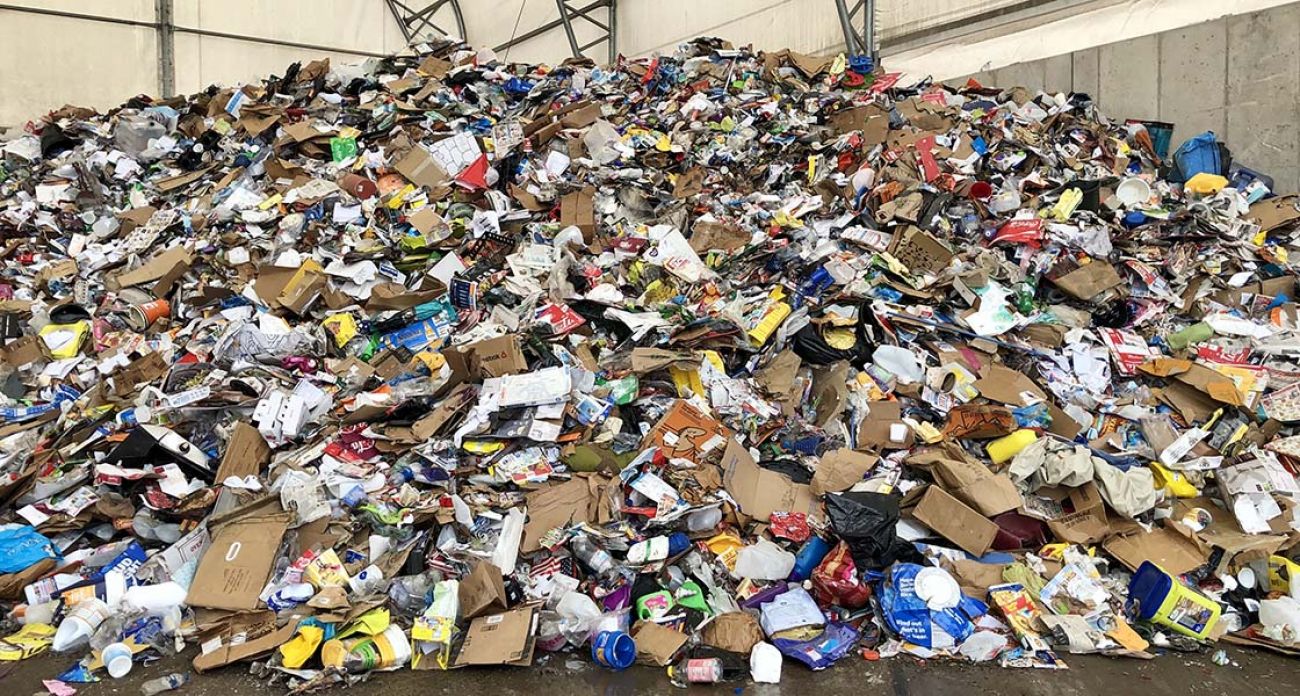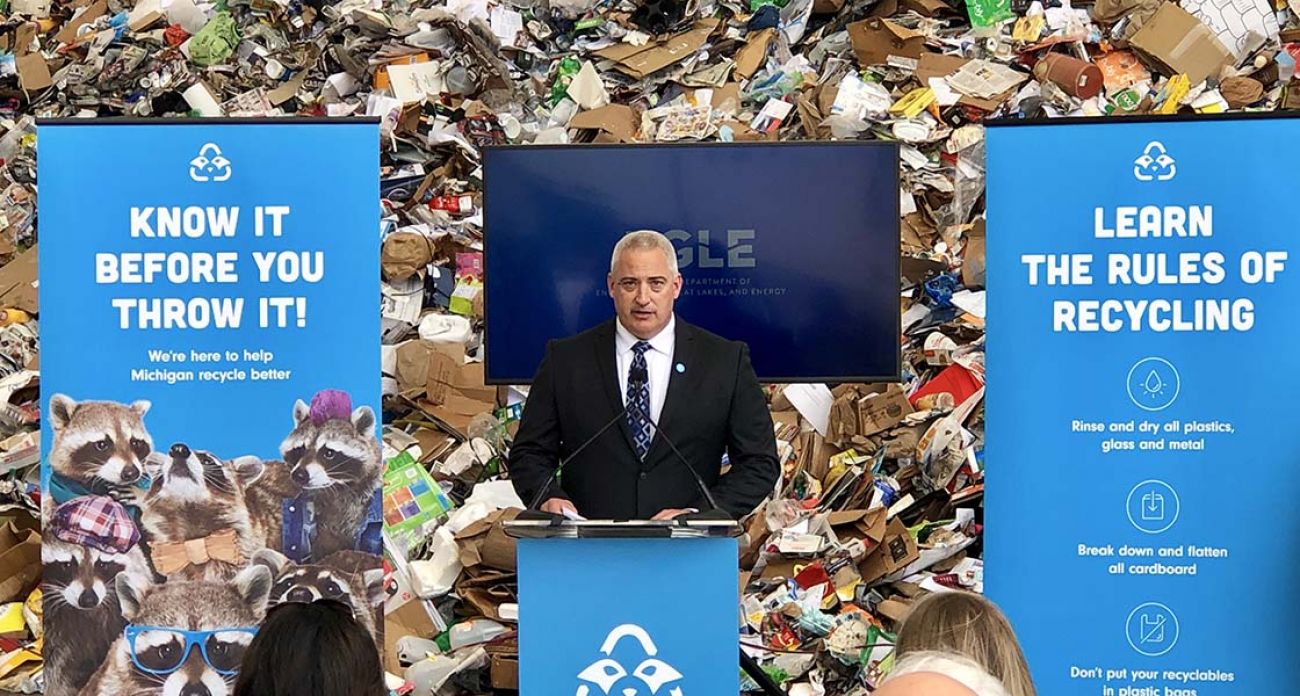Michigan congresswoman pushes national plan to fix recycling woes

A Michigan congresswoman is pushing the federal government to develop a strategy to bolster local recycling programs nationwide — including some in Michigan reeling from a global plunge in prices for recycled paper, plastics and other materials.
U.S. Rep. Haley Stevens, D-Rochester Hills, co-sponsored an amendment to a larger package of spending bills directing the Environmental Protection Agency to develop a strategy to “strengthen markets, reduce contamination, and prevent recyclable materials from needlessly polluting the environment, being incinerated, or sent to landfills.”
“The United States is so far behind in terms of developing and implementing a full-scale recycling industry,” she told Bridge Magazine Wednesday. “We saddle the costs and burdens on consumers and small municipalities. The federal government doesn’t have a strategy.”
The proposal calls the nation’s current recycling system “unsustainable,” and would instruct EPA to examine the benefits of a “national system of standardized recycling labeling,” public education to boost recycling and other methods “to increase the economic viability of processing recyclable materials.”
Related Michigan recycling stories:
- Surging costs cause some Michigan cities to rethink recycling programs
- Michigan was once a leader at recycling. Today, it’s the pits.
- In northern Michigan, Emmet County seen as model for rural recycling
- Opinion | Blaming deposits on low recycling is idea that should be trashed
- Opinion | Michigan’s recycling efforts dragged down by unfair deposit law
The Democratic-led House approved the recycling amendment to H.R. 3055 last week. The chamber Tuesday night cleared the full $690.4 billion package, which would fund a litany of federal agencies, including those dealing with commerce, justice and science.
The package’s fate is less certain in the Republican-controlled U.S. Senate, but backers are optimistic that the recycling provision will survive.
Stevens said conversations with municipal leaders in western Wayne County and news reporting — including a story from Bridge Magazine— fueled her interest in improving recycling.
In March, Bridge spotlighted woes in some Michigan communities after China halted imports of certain recyclables last year and spurred a global collapse in commodity prices. One impacted community is the Detroit suburb of Westland, Michigan’s 11th largest city, which rerouted its recyclables to the dump after a company that processed those materials more than quadrupled its rates.
Aside from pushing for fixes through legislation, Stevens has also appealed directly to EPA Administrator Andrew Wheeler.

“We know the enormous environmental and economic benefits of recycling, and we know there is a great need for action at the federal level,” she wrote Wheeler in an April 29 letter, asking what steps his agency was taking on the issue.
Wheeler has yet to respond, Stevens said.
Once a huge buyer of recyclable scrap from the U.S., China in 2018 banned imports of 24 types of solid waste and adopted strict limits for contamination in other materials it accepts from overseas.
The move addressed concerns that too many tainted materials originally labeled as recyclables had piled up in Chinese landfills and harmed the environment. China’s exit from the global market created a glut of commonly recycled materials like mixed papers and plastics, slashing their worth.
Some Michigan communities are suffering more than others.
Those belonging to regional recycling efforts (such as in Emmet County and southern Oakland County) or with longer-term contracts with waste haulers can weather the storm, but those on short-term contracts are at the mercy of private recyclers who are dramatically raising fees.
China’s maneuver only exacerbated decades-long challenges in recycling and elsewhere, experts say.
Mike Garfield, executive director of the Ann Arbor-based Ecology Center, a nonprofit that has advised communities on recycling plans, flagged the country’s “failure to hold packaging and product manufacturers responsible for the design and recovery of their materials” as a major source of the problems. Additionally, communities across much of the country — including Michigan — have built too many landfills, making it easier and cheaper just to dump materials that could be recycled, he said.
Garfield called it “terrific” that Stevens and others were examining the country’s recycling systems — even if large-scale fixes are far from guaranteed.
“It’s been decades since the federal government looked at the question at all, and the neglect is evident,” he said.
Stevens’ efforts come as the Michigan Department of Environment, Great Lakes and Energy (EGLE) is launching a campaign to raise the state’s region-low 15 percent recycling rate and reduce contamination that erodes the value of materials.
Unveiled Monday at a Lansing press conference, the “Know It Before You Throw It” educational campaign is part of a wider $15 million recycling effort — approved by the Legislature in 2018 — that offers grants to help communities improve facilities and build up local markets to use recycled materials.

Half of Michiganders incorrectly believe they can recycle plastic bags, which most municipalities don’t accept, according to EGLE-commissioned surveys. And 76 percent of residents were not aware of the need to rinse and dry recyclables before dropping them into bins, to avoid contamination.
The agency’s campaign includes a television ad, website and social media accounts that feature a six-member “Michigan Racoon Squad” to serve as “education ambassadors.”
Garfield called the campaign a small, but welcome step toward fixing Michigan’s recycling woes.
“Recycling's been treated like roadkill in Michigan for 30 years," he said.
Michigan Environment Watch
Michigan Environment Watch examines how public policy, industry, and other factors interact with the state’s trove of natural resources.
- See full coverage
- Subscribe
- Share tips and questions with Bridge environment reporter Kelly House
Michigan Environment Watch is made possible by generous financial support from:
Our generous Environment Watch underwriters encourage Bridge Michigan readers to also support civic journalism by becoming Bridge members. Please consider joining today.
See what new members are saying about why they donated to Bridge Michigan:
- “In order for this information to be accurate and unbiased it must be underwritten by its readers, not by special interests.” - Larry S.
- “Not many other media sources report on the topics Bridge does.” - Susan B.
- “Your journalism is outstanding and rare these days.” - Mark S.
If you want to ensure the future of nonpartisan, nonprofit Michigan journalism, please become a member today. You, too, will be asked why you donated and maybe we'll feature your quote next time!



